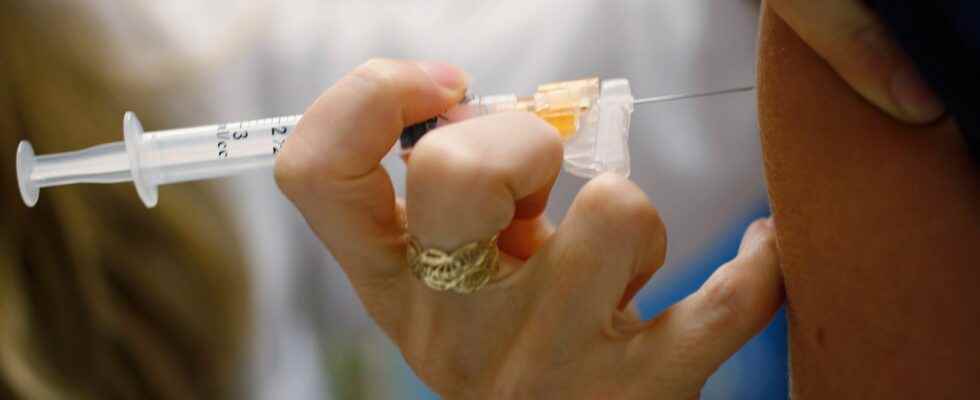This Tuesday, February 28, during a visit to a college in Jarnac, Charente, Emmanuel Macron will announce the launch of a prevention and vaccination campaign against HPV, known as human papillomavirus. From the start of the next school year, 5th graders, in the public and private sectors, should be offered an HPV vaccine at no cost to the parents. However, the measure will not be mandatory. Four days before World Day (March 4) for diseases induced by the human papillomavirus, the executive hopes to raise awareness among as many people as possible, while France is among the worst students in this field. Because some countries, where vaccination is massive, are already in the process of eradicating the papillomavirus and the cancers for which it is responsible.
The papillomavirus is a virus of which there are more than 200 types, which are most often sexually transmitted. It is the cause of various infections of the skin and mucous membranes in women as in men. HPV infections are most often mild because the body eliminates the virus on its own within 6 to 13 months following contamination. But in the opposite case, the infection becomes chronic, and precancerous anomalies can then appear and evolve gradually towards a stage of cancer.
Many institutions, including the National Academy of Medicine and that of Pharmacy, spoke out in 2019 in favor of universal vaccination against the human papillomavirus (HPV) for all adolescents aged 11 to 14 years.
Responsible for 6,000 new cancers every year
Each year, HPV infections are responsible for 6,000 new cancers. In the majority of cases, cancers linked to HPV infection concern the cervix (2,900 cases and more than 1,000 deaths per year), the anus (1,500 cases), the ENT sphere ( 1,500 cases), the vulva or vagina (200 cases). These cancers mainly affect women, but also men for a quarter: a hundred penile cancers linked to HPV infections are recorded each year.
HPV infections are also responsible for more than 30,000 precancerous lesions of the cervix (which we know are detected and treated), sometimes with significant consequences and on the obstetrical future of women, including a risk of preterm delivery doubled. According to a report from themedical academy dating from 2019, “the health cost of HPV infections represents more than 500 million euros per year”.
Only 23% vaccinated
However, there is an effective way to prevent these cancerous lesions and the invasive cancers induced: vaccination. It has been open to teenage girls since 2007 and was extended to boys from the age of 11 in 2021. However, the vaccination coverage rate in France is relatively low. It hardly peaks at 37% for girls and struggles to exceed 10% for boys.
The room for maneuver is therefore considerable, while the ten-year strategy for the fight against cancer 2021-2030 aims for a target of 80% vaccination within seven years. “Young French people are among the Europeans least well vaccinated against HPV infections”, notes the think tank Terra Nova in a report published in early February. Vaccination is performed before the start of sexual life, and its effectiveness in preventing infection with HPV included is close to 100%, according to several studies cited by the Academy of Medicine.
Vaccination is now recommended for girls and boys between the ages of 11 and 14. It can also be offered as a catch-up until the age of 19 and remains possible until the age of 26 for men who have sex with men. According to the World Health Organization (WHO), these cancers can be completely eliminated through screening and vaccination. On November 24, the Minister of Health François Braun went in this direction: “it’s a vaccine that will eradicate cancer of the cervix!”, He had launched during a session in The national assembly.
In Australia, eradication of cervical cancer within 15 years
The serum against HPV infections has long been the victim of “bad press”, mainly linked to the general mistrust of the French towards vaccines. But national and international health organizations are now unanimous: “The listed side effects of HPV vaccines are fairly standard side effects of the ‘start’ of the immune response such as pain at the injection site, fever , fatigue…”, specifies the WHO. Recent studies have shown an absence of link between vaccination and the onset of autoimmune diseases.
In Australia, where vaccination takes place at school, the rate of people infected with HPV causing cervical cancer fell from 22.7% in 2005-2007 to 1.5% in 2015 among young women aged 18 to 24. The country’s forecasts now call for the eradication of cervical cancer within 15 years.
In France, an experiment in the Grand Est region over two years has shown “good results” among young people in 5th grade. The vaccination rate rose from 9% to 27% in the first year and from 14% to 31% in the second. The intervention is based on “going to” the vaccination center within the school, with a first information session and two subsequent vaccination sessions (first dose and booster). The vaccine was 100% covered there.
